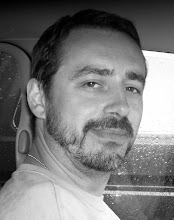One of the best films of 2006 so far,
V for Vendetta, had a fantastic setting--a future Britain ruled by an imaginary government of theocratic fascists--and the cinematic year looks to be seen out by three more film fantasies that also promise to be among the cream of 2006.

Darren Aronofsky’s
The Fountain tells the story of the search for eternal life across three segments of time--the 18th century, the present day, and the far future. Hugh Jackman and Rachael Weisz star in this reportedly visually and intellectually dazzling film that was shot on a comparatively small budget, around $35 million. This will likely be a plus as large budgets for fantastic films often give birth to over-inflated movie grab bags stuffed to bursting with little regard for narrative clarity, invention, or subtlety (example: the moderately entertaining but hollow and overdone
Pirates of the Caribbean: Dead Man’s Chest). The trailer is visually arresting and promises a serious dramatic film, hardly in line with Hollywood’s unspoken rule that all science fiction and fantasy movies must be action films.
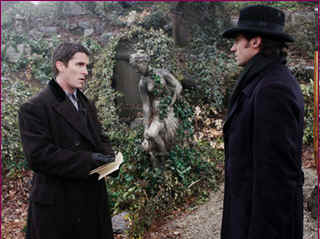 The Prestige
The Prestige reunites the director and main stars of the stylish and engrossing
Batman Begins. Filmmaker Christopher Nolan directs Christian Bale and Michael Caine, along with Hugh Jackman (obviously choosing projects wisely these days) and Scarlett Johansen in a tale about a rivalry between two magicians in 19th century England. With
Memento and
Insomnia also under his belt, Nolan is a smart director with the visual flair of a David Lean, albeit seen through a darker lens.
The Prestige promises to be a brooding, memorable story with excellent lead performances.
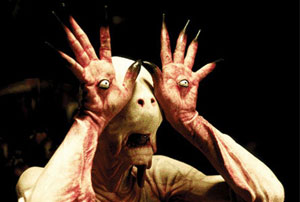
And lastly, there is Guillermo Del Toro’s
Pan’s Labyrinth, a dark fantasy of a little girl’s imaginary world of strange creatures and places that begins to intrude upon the real world, a highly-anticipated film about which I have written before. Del Toro continues to grow as a craftsman and an artist who operates almost entirely within the horror/fantasy genre and, if there’s any sense of cosmic justice, he will make his long-gestating adaptation of H.P. Lovecraft’s enduring short novel of frozen, otherworldly terror,
At the Mountains of Madness.
All three films are guided by directors who have shown themselves to be visionaries with a masterful grasp of visual cinema and, equally as important, an understanding of story, character, and subtext. Aronofsky, Nolan, and Del Toro are exactly the guiding lights that sf/fantasy cinema needs. They are capable of style and narrative and depth; their films are
about something.
After years of largely hollow flash and spectacle, it is about time that sf/fantasy cinema received a boost or even a revolution that moves the genre beyond mega-budgeted popcorn fodder back into the realm of ideas that illuminate the human condition and stories that truly
engage.
Perhaps this triple-blast of smart, imaginative fantasy will do the trick, especially if one of the films can accomplish the near-impossible and overcome the Academy Awards’ traditional snub of genre cinema.
And let’s not forget that, after a multi-year absence from narrative film, one of the great sf filmmakers is returning. James Cameron has announced that he is back in the game with two typically insanely ambitious sf film trilogies in various stages of planning:
Avatar and
Battle Angel. For all their flaws, Cameron’s films show an innate sense of efficient characterization, narrative pacing, and thematic subtext. The writing, direction, and editing of
Terminator 2: Judgement Day are models for how to do an action film right, with a sense of story pacing, using peaks and valleys to give the audience time to breath, rather than a wearying all out assault on the senses.
Cameron really understands how to direct and edit action sequences. Unlike a Michael Bay film (I hate to always pick in him, but it’s so much fun, and he’s one of the worst offenders of the Moulinex Processor school of cutting), the editing is fast but not hyperactive, providing a rhythm and a sense of spatial geography so we know who is doing what to whom and the consequences of each move within a scene. He also knows when to use long shots to provide clarity, and does not chop up action into dozens of close-ups that flash by at seizure-inducing speeds. And in his chase sequences, the camera is in constant motion and not nailed to the floor as vehicles speed by, a pet peeve of mine.
Though Cameron is far from an artsy, philosophical director (he deals in spectacle and broad-brush themes), his films do have subtext.
T2 and
The Abyss both dealt with the innate human tendency to destroy and the potential dangers of unfettered technology.
Titanic, Cameron’s biggest hit, warned about the hubris of thinking our solipsistic technological superiority imbrues us with the ability to conquer all the forces the world can throw at us. It also, of course, worked at a personal level, regarding breaking through social prisons of convention to pursue what and who we truly love. These are big, somewhat simplistic themes, but their mere presence in huge action spectaculars are enough to make Cameron’s films more interesting than the lion’s share of this type of movie.
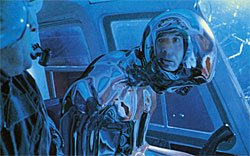
Cameron also pushes the envelope in terms of movie technology. The water tentacle in
The Abyss and the T-1000 from
T2 were pioneering uses of computer graphics imagery, or CGI, now so prevalent (some may argue overused) in the film industry. It remains to be seen how he will apply new technology in his upcoming films, but the prospects of new cinematic tools in the hands of a filmmaker that respects narrative is enticing.
Let us hope that the somewhat stagnant state of sf/fantasy filmmaking receives a shot in the arm from the likes of Aronofsky, Nolan, Del Toro, and Cameron. I think the genre is in desperate need of a revolution.
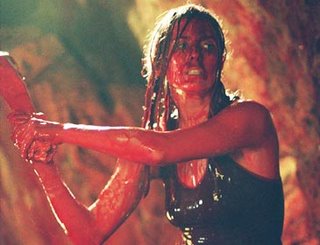 Though it has been compared with Ridley Scott’s Alien, the true touchstone for The Descent is Apocalypse Now, with the common thread of a journey downwards or backwards in time into primeval savagery. Writer/director Neil Marshall, here making his second feature after the cult horror/action film Dog Soldiers, takes the camera up above the trees at the beginning of the protagonists’ journey, bringing it down to ground level, and then following the group beneath the earth into dank, primordial caverns and crawlspaces lit only by flares, flashlights, glowsticks and, in a deft touch, the infrared LCD screen of a digital video camera.
Though it has been compared with Ridley Scott’s Alien, the true touchstone for The Descent is Apocalypse Now, with the common thread of a journey downwards or backwards in time into primeval savagery. Writer/director Neil Marshall, here making his second feature after the cult horror/action film Dog Soldiers, takes the camera up above the trees at the beginning of the protagonists’ journey, bringing it down to ground level, and then following the group beneath the earth into dank, primordial caverns and crawlspaces lit only by flares, flashlights, glowsticks and, in a deft touch, the infrared LCD screen of a digital video camera. 



